Creating the Approval Step
To create an approval step of the specific data set, open approval step wizard.
After the basic step properties have been determined, click the Next button on the first page of the wizard.
Step Description
The next wizard page is Step Description:
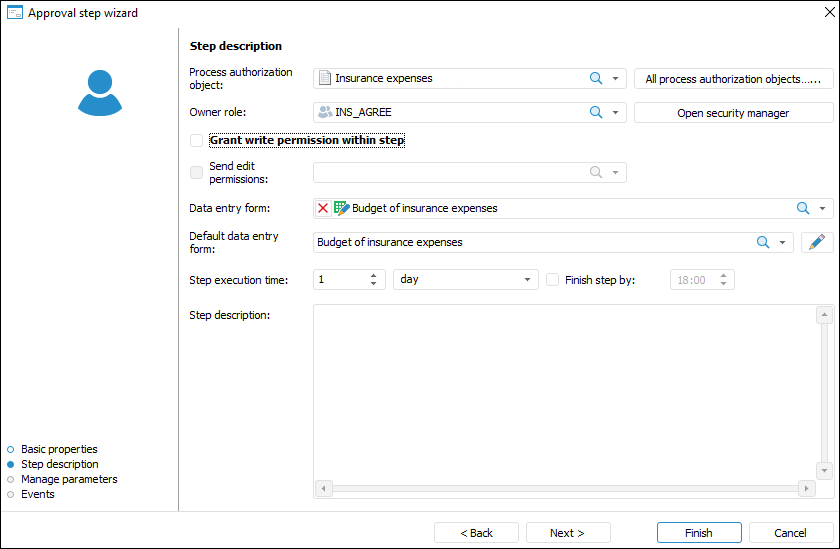
Determine the following for the Approval step on the Step Description page:
Process Authorization Object. The box is mandatory. In the drop-down list of authorization objects select the required object.
If there is no appropriate authorization object, click the All Process Authorization Objects button. The Set Up Process Authorization Objects dialog box opens where an object can be added.
Owner Role. The box is mandatory. In the drop-down list select the owner role. The list contains roles of users specified in the authorization object.
If there is no required group of users in the list, click the Open Security Manager button. The dialog box of security manager of Foresight Analytics Platform opens, which enables the user to create the required group of users.
By default, the selected user has read-only permission.
Grant Write Permission Within Step. Select the Grant Write Permission Within Step checkbox to grant dynamic write permission to data segment to a group or a user specified in the Owner Role list. Dynamic permission is applied only on step execution.
When the checkbox is deselected, group or user will have read-only permission.
Send Edit Permissions. Select the Send Edit Permissions checkbox and select the group or user in the list to assign read and write permissions to data segment. When this checkbox is selected, the group or user selected in the Owner Role box get read-only permissions.
The checkbox is deselected by default. To enable the option, select the Grant Write Permission Within Step checkbox.
Default Data Entry Form. The box is mandatory. The data entry form that opens by default on process step execution. Select a data entry form in the drop-down list, use search. The list contains repository objects tree where data entry forms and folders containing them are only displayed.
To edit the selected data entry form, click the  button. The data entry form will be opened for edit.
button. The data entry form will be opened for edit.
- Step Execution Time. The time, in which a step must be executed on process execution.
Enter a numeric value of step execution time and select a time measurement unit in the list:
Minute.
Hour.
Day (default).
Week.
Month.
Quarter.
Half-year.
Year.
To determine time by which step must be finished, select the Finish Step By checkbox. On selecting the "minutes" or "hours" time measurement units, this box is hidden.
If the step is not finished by the scheduled execution period, the step status becomes Expired.
The step execution period impacts the whole process execution period, which is determined on starting process for execution.
Step Description. The box is optional. A text box for entering a comment for a step.
After the parameters have been determined on the Step Description page, click the Next button.
Managing Parameters
The next wizard page is Manage Parameters:
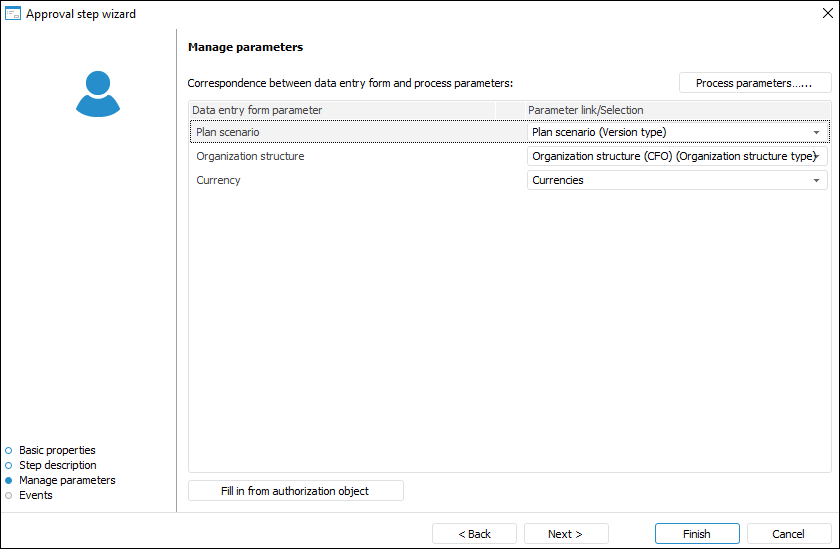
Determine the following for the Approval step on the Manage Parameters page:
Data entry form and process parameters must be linked to open data entry form with the same parameters as the process step started for execution. Determine Correspondence Between Data Entry Form and Process Parameters on the Manage Parameters page:
To automatically copy parameter settings from authorization objects, click the Fill from Authorization Object button.
- To manually set correspondence in the Parameter Link/Selection column, select the checkbox:
Undefined. In this case data entry form is opened with parameter value specified in data entry form by default:
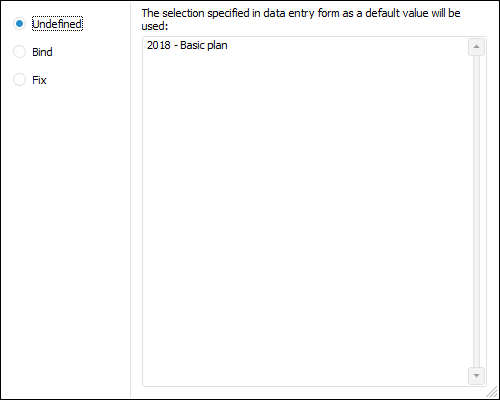
Bind. In this case the process parameter corresponding to data entry form parameter is selected:
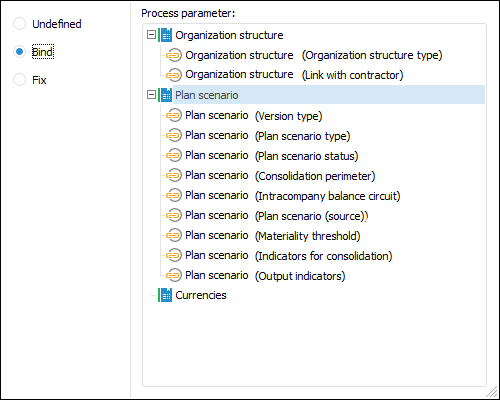
Select the dictionary attribute to be send as parameter to data entry form if required.
Fix. In this case, the specified values are selected in the drop-down list, in order to send a limited list of parameter values to data entry form:
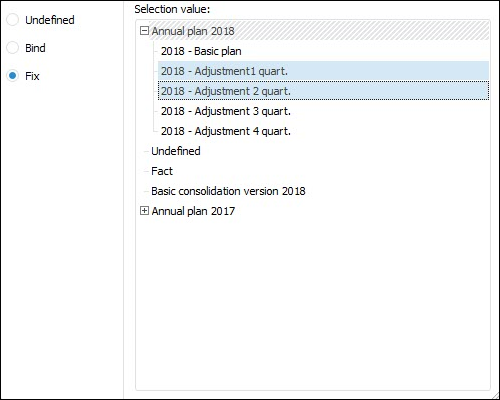
If there is no required process parameter, click the Process Parameters button. The Process Settings and Parameters dialog box opens, in which a process parameter can be added.
After the parameters have been determined on the Manage Parameters page, click the Next button.
Events
The next wizard page is Events:
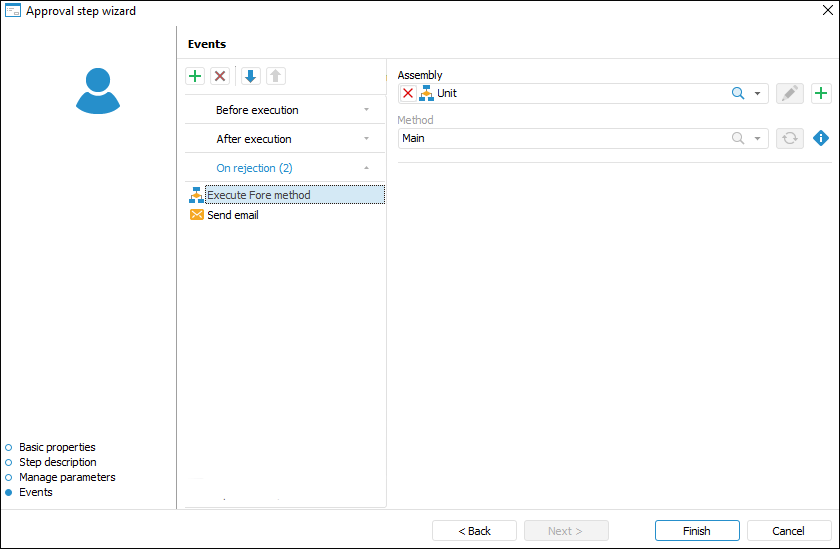
Set up automatically executed actions launched on step execution start or end.
On generating a list of executed actions, select a tab with event first:
Before Execution. The list of actions will be started before executing the current step in the specified order.
After Execution. The list of actions will be started after executing the current step in the specified order.
On Rejection. The list of actions will be started on the current step rejection. The list is available for steps with manual execution. If the step is executed automatically, the tab is not displayed.
On Failures. The list of actions will be started on failure to execute the current step in the specified order. To execute the actions:
When the server execution of processes is selected, select the Check Steps Execution Failures checkbox on the Scheduler page of the Parameters Setup and Business Process Management dialog box and set check frequency.
When the client execution of processes is selected, select the Check Failures item on the Administration page of the Parameters Setup and Business Process Management dialog box.
To add an event, click the  button on the ribbon. The number of added actions is unlimited.
button on the ribbon. The number of added actions is unlimited.
Actions to be added:
 . Execute Fore method. In the right part of the window select:
. Execute Fore method. In the right part of the window select:Unit. In the drop-down list select a unit written in the Fore language, the list contains all repository units and folders containing units. Search by unit name is available.
To edit the selected unit, click the  button.
button.
To create a unit, click the  button.
button.
Method. In the drop-down list select a method. The list contains all unit methods corresponding to the signature:
Sub <Fore-method name>(Sender: IBProcessInstance; Args: IBProcessStepStateEventArgs);
Parameter:
Sender. Process instance.
Args. Event information: step, step old state, new state.
To refresh the methods list, click the  button.
button.
To copy method signature, click the  button.
button.
 . Send Email. In the right part of the window select:
. Send Email. In the right part of the window select:To; Copy; Bcc. The recipient email is entered manually, using option of copy/paste from clipboard.
Subject. The email subject is entered manually, using option of copy/paste from clipboard.
Contents. The contents is entered manually using the option of variables values substitution with step parameters, links to step objects to view in the web application, file attachment.
To change order of operations execution, use the  /
/  buttons on the toolbar, to delete use the
buttons on the toolbar, to delete use the  button.
button.
The list of automatically executed actions can be empty.
Click the Finish button to exit the wizard.
After creating the process steps, set up process steps execution conditions.

 To open the wizard
To open the wizard